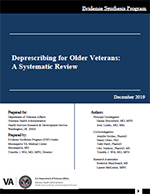
|
Prepared by: Recommended citation: |
Download PDF: Complete Report, Executive Summary, Report, Appendices
More than 40% of people in the United States age =65 years take 5 or more prescription medications on a regular basis to control and/or prevent disease symptoms and complications. Exposure to multiple medications, known as polypharmacy, is associated with increased risk of negative outcomes, such as falls, cognitive impairment and other geriatric syndromes, hospitalizations, and death. The number of medications a person is taking may be the single most important predictor of adverse drug effects. Furthermore, about 50% of older adults are taking 1 or more potentially inappropriate medications (PIMs), including those without a clear indication, duplicative medications, and medications known to pose risks in the elderly.
Efforts have been underway for more than 30 years to develop and test interventions to mitigate the adverse effects of polypharmacy and inappropriate medication use. Initially, drug discontinuation efforts were focused on stopping specific medications considered to be problematic in older adults. This has evolved into a more holistic approach, called "deprescribing", that considers medications in the context of the individual's co-morbidities, functional status, treatment goals, and life expectancy. Deprescribing has been defined as "the clinically supervised process of stopping or reducing the dose of medications when they cause harm or no longer provide benefit".
The Center for Medication Safety in Aging, a VA Patient Safety Center of Inquiry, was charged with development and implementation of deprescribing approaches in VA settings. The purpose of this evidence review, commissioned by the National Center for Patient Safety and endorsed by the VHA Pharmacy Benefits Management and the Geriatrics and Extended Care Services, is to inform that work.
The key questions for the review were as follows:
KQ1: What are the effectiveness, comparative effectiveness, and harms of deprescribing interventions among adults age 65 and older?
KQ1a: What are the identified elements/components that contribute the most to the effectiveness of deprescribing interventions?
KQ1b: Do the effectiveness, comparative effectiveness, and harms of deprescribing interventions vary by patient population, provider factors, or setting?
KQ2: What are the identified facilitators and barriers that impact the implementation of deprescribing interventions within large-scale health systems such as VA?.
Deprescribing for Older Veterans: A Systematic Review (Management eBrief)
ESP Report: A Systematic Review and Meta-Analysis of Interventions for Deprescribing in Community Dwelling Older Adults (Cyberseminar)
Bloomfield H, Greer N, Linsky A, et al. Deprescribing for Community-dwelling Older Adults: A Systematic Review and Meta-analysis. JGIM. 35(11):3323-3332. https://doi.org/10.1007/s11606-020-06089-2.
Increasing impact of evidence synthesis through integration of first-hand experiences of Veterans and clinicians (Deprescribing Narrative)